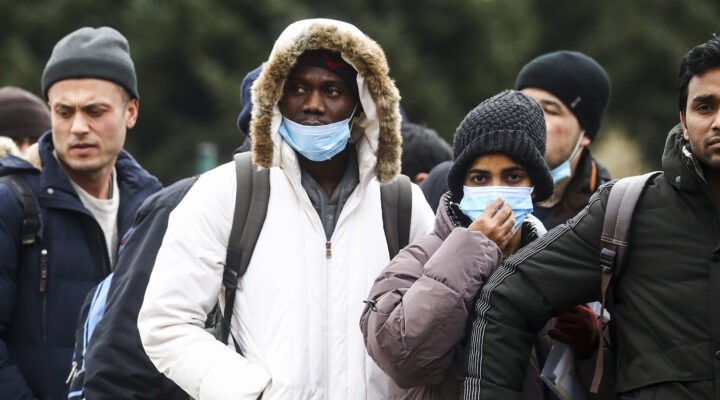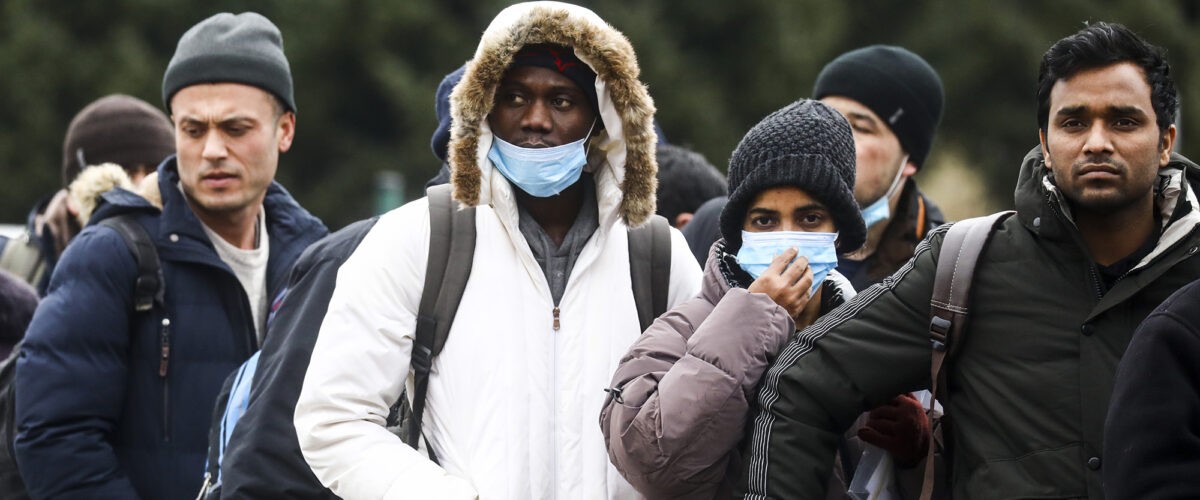Black and Asian refugees fleeing Ukraine due to Russia’s unprovoked and deadly attack there are facing discrimination as they attempt to enter neighboring countries such as Poland.
After multiple news reports of such discrimination, a member of Allen Temple Baptist Church in Oakland, Calif., rallied other members of the United States Congress to join in appealing to the European Commission to advocate for racial minorities.
The letter to Ursula von der Leyen, president of the European Commission, urging humane and non-discriminatory treatment for Black and Asian refugees, was originated by Rep. Barbara Lee, who serves as chair of the Appropriations Subcommittee on State and Foreign Operations. Joining her were Reps. Joyce Beatty, D-Ohio, chair of the Congressional Black Caucus; Gregory W. Meeks, D.-N.Y., chair of the House Foreign Affairs Committee; Karen Bass, D- Calif., chair of the House Foreign Affairs Subcommittee on Africa, Global Health, Global Human Rights and International Organizations; and Stacey E. Plaskett, Virgin Islands.
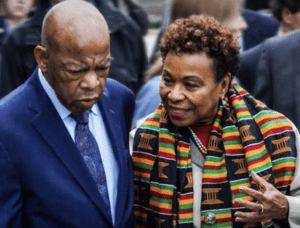
Rep. Barbara Lee with the late John Lewis.
“We write with concern regarding the treatment of people of African and Asian descent who are trying to flee Ukraine,” the letter begins. “Thank you for clarifying that the borders of the European Union are open to everyone fleeing the war in Ukraine. Nonetheless, numerous press and social media reports indicate that many Black families, immigrants from the African diaspora and other people of color are subject to discriminatory or inhumane treatment as they seek to flee Ukraine for the safety of other European countries.
“Racism, discrimination, and cruelty are always unacceptable, but even more so during a war and humanitarian crisis. Anyone in Ukraine seeking refuge from this blatant attack on Ukrainian sovereignty must be treated with dignity and respect. Governments have an obligation to take every step necessary to protect the human rights of all people fleeing conflict, regardless of race or ethnicity.”
Many British and U.S.-based media outlets have reported variations on the same story. For example, The Guardian reported: “Police in Poland have warned that fake reports of violent crimes being committed by people fleeing Ukraine are circulating on social media after Polish nationalists attacked and abused groups of African, south Asian and Middle Eastern people who had crossed the border last night.
“Attackers dressed in black sought out groups of non-white refugees, mainly students who had just arrived in Poland at Przemyśl train station from cities in Ukraine after the Russian invasion.”
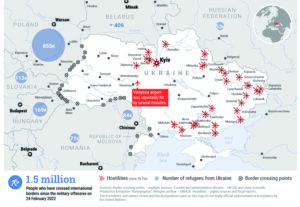
Graphic courtesy of UNHCR
To date, about half the 1.5 million people fleeing Ukraine have entered Poland, according to the United Nations High Commission on Refugees.
Despite the racial profiling of Polish nationalists, the majority of Poland’s citizens are welcoming refugees with open arms, the UNHCR noted.
However, social media and major international news outlets continue to report that non-white refugees are facing additional barriers to entering other countries — barriers not put up for white refugees or ethnic Ukrainians.
By some accounts, the problem is not only on the Polish side of the border but also at the checkpoints leaving Ukraine.
“The problem isn’t at the Polish border,” Nigerian student Jessica Orakpo told BBC News Africa. “It is at the Ukrainian border because you have to step out at the Ukrainian border to get on the Polish side, and the Ukrainians are only prioritizing their citizens. They don’t care. They will push you. They will beat you. If you can make it, you make it. If you don’t, you don’t.”
Orakpo told the BBC: “The official literally looked me in my eye and said in his language, ‘Only Ukrainians. That’s all, that if you are Black, you should walk.’”
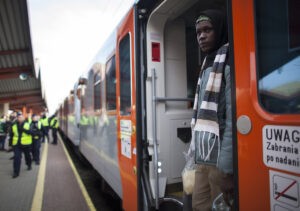
Ukrainian refugees arrive in Przemysl, Poland, on March 1, 2022. (Photo by Maciej Luczniewski/NurPhoto via AP)
Black and Asian residents are a distinct minority in Ukraine, and many of them are students. There is a 60-year legacy of Ukraine recruiting Africans to study there. According to a Brookings Institution report, more than 16,000 African people are studying in Ukraine, accounting for more than 20% of Ukraine’s international students.
Ukraine has a total population of 41.4 million people. The U.N. estimates 4 million people will be forced to flee the country due to the Russian aggression.
CNN interviewed an African medical student who said she and other foreigners were ordered off the public transit bus at a checkpoint between the Ukraine and Poland border. They were told to stand aside as the bus drove off with only Ukrainian nationals on board, she told CNN.
“More than 10 buses came, and we were watching everyone leave. We thought after they took all the Ukrainians they would take us, but they told us we had to walk, that there were no more buses and told us to walk. My body was numb from the cold, and we haven’t slept in about four days now. Ukrainians have been prioritized over Africans — men and women — at every point. There’s no need for us to ask why. We know why. I just want to get home.”
The Brookings Institution further noted: “There are many reports of Black people being refused at border crossings in favor of white Ukrainians, leaving them stuck at borders for days in brutal conditions. Ukraine stated they would first allow women and children on trains and transport out of the country to flee the Russian invasion. However, it seems they meant Ukrainian and European women and children. Videos show Black people being pushed off trains and Black drivers being reprimanded and stalled by Ukrainians as they try to flee. There are even reports of animals being allowed on trains before Africans.”
Rejected for a seat on a bus, Orakpo, the Nigerian student interviewed by the BBC, had to start walking. After 12 hours of walking, a traffic warden saw her and recommended she go to a shelter to sleep. The next day, she was told a bus would take those at the shelter to Poland, but when the bus arrived, she was told it was only for Ukrainians. She then set out on foot again and walked an additional eight hours.
Related articles:
Religious liberty in Ukraine is ‘doomed’ if Russian invasion succeeds
Let’s be clear: Putin’s invasion of Ukraine is not about the rapture and Russia in biblical prophecy | Analysis by Rodney Kennedy
Don’t forget the religious implications of geopolitical upheaval | Analysis by Richard Wilson

